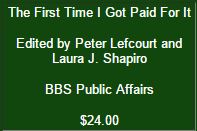‘The First Time I Got Paid For It’ Edited by Peter Lefcourt and Laura J. Shapiro
Screenwriters take readers along on their roads to acceptance
By Rebecca Redshaw
Reprinted from the Pittsburgh Post-Gazette
 Sunday, December 03, 2000
Sunday, December 03, 2000
The temptation when reading this essay collection is to skip ahead to a favorite screenwriter’s entry. Compiled by Peter Lefcourt and Laura J. Shapiro, the book features the thoughts of 50 screenwriters on writing in general and “the first time” they were hired as writers, specifically.
Behind-the-scenes legends such as Fay Kanin (“Teacher’s Pet”), Devery Freeman (Desilu Playhouse), and Joan Tewkesbury (“Nashville”) contributed, along with current hot writing commodities Cameron Crowe (“Jerry Maguire,” “Almost Famous”), Steven Bochco (“NYPD Blue”) and Richard LaGravanese (“The Horse Whisperer”).
If one is a fledgling writer looking for inspiration or encouragement or both, this book offers enough variety of experience to grasp some glimmer of hope in a very competitive and cutthroat business. If one is looking for a lightweight, entertaining look behind the scenes in Hollywood, this book is a fun read.
Writers, given the opportunity to express their own opinions, don’t let a little thing like a specific premise of the “first time” get in their way. After all, submitting a screenplay is only the first step in the frustrating process of countless rewrites by other writers. So, many of the writers take this space and make it their own.
Tewkesbury philosophizes about an experience in a stark motel room that recalls “the process” of dialogue.
Beth Sullivan, creator of the series “Dr. Quinn, Medicine Woman,” canceled under her protest, uses her space to pontificate on the process of programming and how marketing can be skewed from reality.
Other writers had more fun with their pages. Peter Mehlman, who wrote the “Yada Yada” episode of “Seinfeld,” used a bout with mononucleosis, and the downtime it demanded, to launch his writing career.
Alan Alda describes “a thrill, a rush of joy, a desire to dance around the room” that comes from putting words together. In four humorous pages, “M*A*S*H” creator Larry Gelbart (“Oh, God, ”“Tootsie”) tells more about his life than some writers can in a 400-page tome.
The majority of the contributors share two things: One, disdain for agents, most of whom come across as uncaring and inattentive until the money starts rolling in and, two, the reality of rejection. The first script Lawrence Kasdan (“The Big Chill”) submitted was rejected 67 times.
One gets the feeling while leaping from one scribe to the next that some are remarkably candid while others are trying to impress. Writer of “Indecent Proposal,” Amy Holden Jones doesn’t hesitate to retell her first foray into filmmaking with the politically incorrect production of Roger Corman’s “Slumber Party Massacre.”
Her candor comes off far more genuine than James V. Hart’s drooling tribute to Francis Ford Coppola, as if he were an adolescent boy meeting his idol rather than an established screenwriter in production.
Most helpful in the realities of “the business” is the piece by Pamela Gray (“Music From the Heart”). She shares excerpts from 14 years of her journal that outline the frustrations of getting a script from paper to the screen.
Being a good writer is not determined by dollars or deals. Even though these people have been fortunate to be rewarded financially for their work, they seem to share many of the same foibles of all struggling writers. Gary Ross, who penned “Pleasantville” and “Dave,” expresses the writer’s dilemma very well.
“I was in that horrible blind spot where every writer lives at the beginning of a career. Sure, I had faith in my writing ability but maybe it was delusional. … I was a genius. I was a fool. I was a craftsman. I was a hack. I was better than what I just read. I could never live up to what I just read. I envied. I scoffed. I dreamed. I despaired. I felt vitally alive. I felt hopelessly dead. I finally got a phone call.”